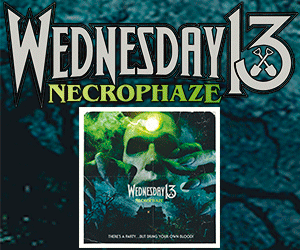Dani Filth dishes on how he got into horror and how he actually made Tony …
In Cauda Venenum (Latin for Poison the Tail) is a strange album. Then again, when has anyone ever accused Swedish veteran prog-rock (formerly metal) masters Opeth of being completely fucking normal?
MORE: HALLOWEEN HYSTERIA 2019: Throws A Hard Six With New Additions To Line-Up // OPETH: Rock Cottage Industry REVIEWS: DZ DEATHRAYS: Positive rising: Part 1 // BLINK 182: Nine // STEEL PANTHER: Heavy Metal Rules
They’ve released kinda-sorta concept albums in the past (1998’s My Arms, Your Hearse and 1999’s Still Life) and this one is so bound up in concept it’s spawned two versions—a Swedish and English language version, just so everyone can follow the story. (What that story is? Well…)
In some ways, this is Opeth’s Scenes from a Memory; a pull out of every musical stop Mikael Åkerfeldt has at his command and cast into a kaleidoscopic “musical novel.”
Dignity is the first proper track, following lilting intro Garden of Earthly Delights. It’s drenched in thick Hammond organ and deliberate, pounding stomps not too far removed from Led Zeppelin’s slower cuts. It sets up the piece; this is one big prog rock homage and anything that resembles polyester or spandex is förbjuden.
Heart in Hand is the closest to metal we’ll get on here, thundering through pulsing riffs and odd-timed Rush-isms. Charlatan might have the clawmarks of the old Opeth scratched into it, a dense, often impenetrable wall of low-end crafted by three basses as a flute floats and flutters about the place. Yanno, if Jethro Tull were metal. (Universal Truth is total Tull worship, not that there’s anything wrong with that.)
In some ways, this is Opeth’s Scenes from a Memory; a pull out of every musical stop Mikael Akerfeldt has at his command and cast into a kaleidoscopic “musical novel”
Lovelorn Crime is a piano-driven jazz tune, with scant pulls on guitar. It might be a B-side to a later Katatonia cut, especially from their Dethroned and Uncrowned “unplugged” experiment from 2013. Mikael’s clean vocals are resonant, rich, and brimming with feeling. It leaves his growling seem a little one-note by comparison.
The Garroter indulges in shuffling, syncopated jazz down to brushed drums and piano, backed up by warm and fuzzy mellotron. It’s still a little jarring, but one expects them to launch into a full metal onslaught. It never comes. Weird how old habits die hard.
Continuum softens into some King Crimson meanderings and lullabies; and it’s the track where a bit of a rock n’ roll blitzkrieg does storm in halfway through. Someone finally accepted the charges from guitar heroism’s call, it seems.
All Things Will Pass, possibly an homage to George Harrison (the best Beatle, don’t @ me), is Opeth’s sprawling conclusion that builds from meagre foundations of sweetly sung acoustic folk to a grandiose, anthemic orchestra of mellotrons, piano, and everything else they could throw at it. On this track especially, their warm valve n’ tape production even shines through on lowly mp3, lending it a laid-back, jam style glow.
The major gripe with Opeth is their new “toothless” style has seen them back-pedalling into bushes, camouflaged among the rest of these 70s jam revivalists (Kadavar, Blues Pills, etc.) doing the exact same thing. Finally, after three albums of samey-sameness, In Cauda Venenum sets Opeth apart from the pack of countless other imitators.
STANDOUT TRACKS: Charlatan, Heart in Hand, The Garotter
STICK THIS NEXT TO: Pain of Salvation, Rush (newer), Porcupine Tree







